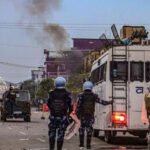Tuesday, November 12, 2024
Year : 2, Issue: 11
Reuters: Sri Lanka votes to elect a new parliament this week in a snap general election called by its Marxist-leaning president who wants a fresh mandate in the legislature to drive economic reforms in the debt-ridden island nation.
Anura Kumara Dissanayake was elected president of the South Asian country in September but his National People’s Power (NPP) coalition had just three of 225 seats in parliament, prompting him to dissolve the legislature and seek a fresh mandate there for his policies.
Dissanayake, an outsider of the family parties that have dominated Sri Lankan politics for decades, swept to power promising change as the country emerges from a crushing financial crisis. Millions of voters put faith in his graft-fighting pledge and vows to bolster a fragile economic recovery.
“In past elections, people did not have confidence in us but in September people gave us victory and proved that we are a winning party and we can form a government,” Dissanayake said during a campaign rally on Sunday. “The next task is to unite people from the four corners of this country and build a powerful people’s movement.”
Sri Lankans were hit hard by the 2022 economic crisis, which was triggered by a severe shortfall of foreign currency that added to problems caused by the COVID-19 pandemic.
Buttressed by a $2.9 billion bailout programme from the International Monetary Fund, the economy has posted a tentative recovery, but the high cost of living is still a critical issue for many voters.
Dissanayake aims to change the revenue goals set under the IMF programme to reduce high income taxes and free up funds to invest in welfare for millions of Sri Lankans hardest hit by its financial crisis.
Investors worry that Dissanayake’s desire to revisit the terms of the country’s IMF bailout could delay future disbursements, and make it harder for Sri Lanka to hit a crucial primary surplus target of 2.3 percent of GDP in 2025 set under the programme.







